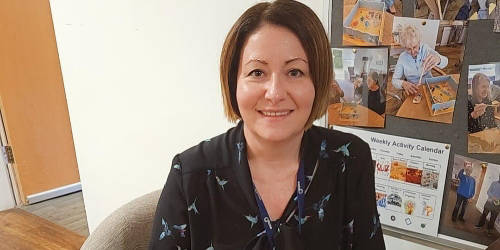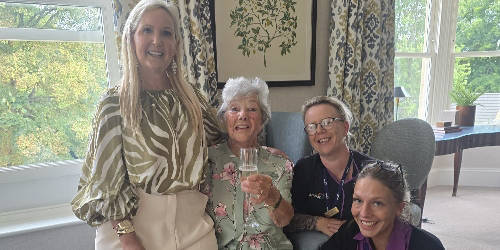- Home
- News & events
- Blog
- Tips for understanding and supporting a loved one with dementia
17 May 2021
Tips for understanding and supporting a loved one with dementia
There are more than 850,000 people living with dementia in the UK and this figure is projected to rise to more than 1.5 million by 2040. Today, a person is diagnosed with dementia every three minutes.
Being diagnosed with dementia can be a daunting and upsetting time, but by planning ahead and learning more about the condition, it is possible to help your loved one continue to live a fulfilling life, filled with joy, laughter and aspirations.
Diane Armstrong, Dementia Lead at Anchor Hanover, England’s largest not-for-profit provider of care and housing for people in later life, gives some tips and advice on how to understand what a person with dementia is going through and provide them with the help and support they need.
1. Start honest conversations with loved ones
Despite the increasing prevalence of dementia, nearly half of the UK population (47%) have never had a conversation about it with their loved ones. In fact, our research shows that as a nation, we would rather talk about divorces and breaks-up, and our weight, than about dementia.
Often, people are reluctant to discuss it because they don’t want to worry their loved ones or cause distress, but the simple truth is that a conversation is a vital starting point to prepare us for what may come in our later life and ensures the right decisions can be made at the right time.
Using the right questions can help families begin important conversations in a positive and proactive manner. Here are some suggestions:
I’d like to talk about something with you, but first I’d like to get your point of view. Is now a good time?
What are your/our concerns about getting older? What could happen if we don’t do anything about those concerns?
What kind of experience would you like to have as you grow older? What kind of experience would you like me to have as I grow older?
2. Spot the early signs
Broadly, the symptoms associated with dementia are a decline in memory, reasoning and communication skills, a gradual loss of the ability to carry out daily activities and to make sense of the world around us, and confusion.
The symptoms of dementia gradually develop over time, but how fast dementia progresses will depend on each individual.
The NHS advises that if you, or a loved one, is becoming increasingly forgetful, particularly if aged over 65, it is a good idea to seek medical advice in case it could be an early sign of dementia. Often, the fear of dementia can prevent people from seeking help or advice – but doing so early could rule out causes that may be treatable.
3. Understanding care options
If a person’s dementia means that they are no longer able to live independently in their own home and need specialist dementia care or support, there are lots of different care options available designed to meet their changing needs.
When considering residential care options, it is important to visit care homes, meet the staff and see if the facilities meet the particular needs of you or your loved one. Facilities vary from home to home and, as a person’s needs may change with time, you should feel confident the home you choose offers the right level of care and support. During the coronavirus pandemic, visits can be organised virtually, so you still have a chance to see the home, meet some of the team and ask any questions.
Wherever you look, asking about dementia expertise is a good idea. At Anchor Hanover, all of our care homes have staff trained to recognise the symptoms of dementia and offer expert support to residents in a compassionate and considered way, that meets their individual needs and preferences.
A good place to start when searching for a care home is the Care Quality Commission (CQC) website as well as Carehome.co.uk. Anchor Hanover also has produced a helpful ‘checklist’ to help families find the right care home for their loved ones.
4. The value of activities
People living with dementia should have access to a wide range of carefully considered and meaningful engagements that reflect and support their hobbies and personal interests. It could be that the person used to dance when they were younger, so taking them to a dance show or competition, or watching or talking about dancing could be entertaining. It’s important to make sure the activity is something that the person can be actively engaged in, so they won’t feel like they can no longer take part in a favourite hobby or interest.
Music, for instance, can have a transformative effect on people living with dementia. It can help recall certain memories, transport people back to a favourite place and reconnect them with loved ones. Whether listening to big band classics, rock music or relaxing country songs, music has the power to help relieve the anxiety, stress and agitation sometimes felt by those living with dementia.
5. Recognise emotions
Meeting the emotional needs of people living with dementia can be hard. Often a person can have trouble expressing themselves, which may lead to frustration. The best thing to remember is that each person is an individual, and all behaviour is a means of communication. How you respond in any situation should be personal to the individual – this is often called person-centred approach, or personally tailored care.
Communication can be difficult for both the person living with dementia and those caring for them, for example, when someone could be asking to see a relative who is no longer alive. It is hard to know how best to respond when you don’t want to upset or challenge the person who may be living with a different sense of reality. In this difficult situation it helps to focus on the emotions being expressed rather than the facts of the situation, and acknowledge what the person might be feeling, for example, “I can see you look upset, can I sit with you for a while, and you can tell me about your mum”.
By showing that you recognise their emotions and exploring why they are asking for that relative, you can help them to feel supported and secure, allowing space and time to explore what you might be able to do to reassure and help.
6. Embrace technology
Every day, our colleagues see first-hand the benefits of using technology to bring people together and engage people living with dementia. Electronic tablets can provide access to lots of information, pictures, music, and films to help calm and engage. We use tablets to connect with all residents, tailoring activities such as bingo and photo galleries to suit people’s own interests and life experiences.
Virtual reality can also be used to support some people living with dementia to reminisce, although it might not be suitable for everyone. You can download virtual reality apps on tablets / phones that allow people to be transported back to bygone days. Virtual reality headsets for these can be bought quite easily online.
7. Look after yourself as well as your loved one
Caring for loved ones with dementia can be challenging as well as fulfilling, and it’s important to have time to recharge and look after yourself too.
There will be frustrations, perhaps on both accounts, but remembering the individual and taking time to acknowledge and validate what they are feeling is important.
For further information and guidance on understanding and living with dementia, you can download Anchor Hanover’s Reframing Dementia guide here.
Read more from Anchor Hanover
This website uses cookies which track activity so that you get the best possible experience. By continuing to use this website we will assume you are happy and cookies will be set. You can change your cookie settings at any time.



















